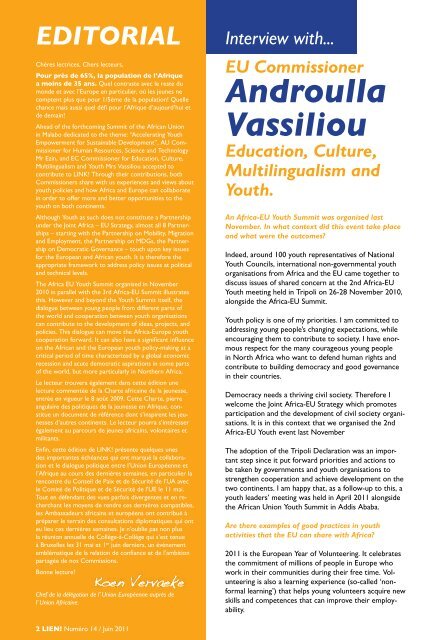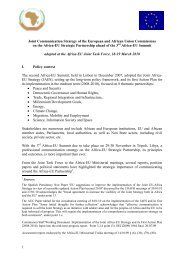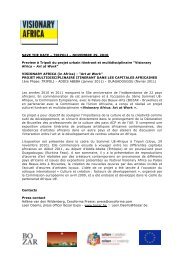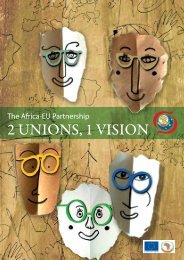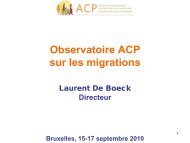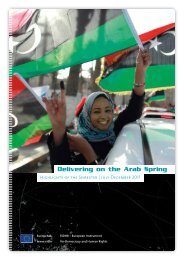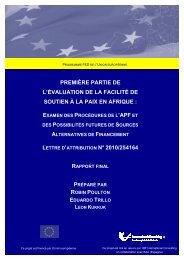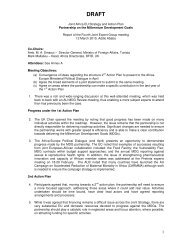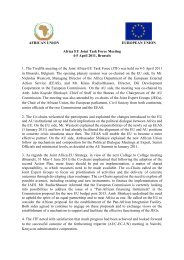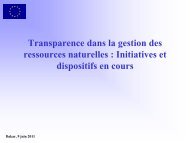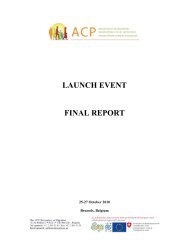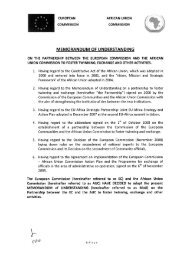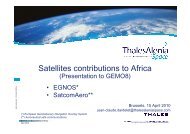LINK! 14 - June 2011 - the European External Action Service - Europa
LINK! 14 - June 2011 - the European External Action Service - Europa
LINK! 14 - June 2011 - the European External Action Service - Europa
You also want an ePaper? Increase the reach of your titles
YUMPU automatically turns print PDFs into web optimized ePapers that Google loves.
EDITORIAL<br />
Chères lectrices, Chers lecteurs,<br />
Pour près de 65%, la population de l’Afrique<br />
a moins de 35 ans. Quel contraste avec le reste du<br />
monde et avec l’Europe en particulier, où les jeunes ne<br />
comptent plus que pour 1/5ème de la population! Quelle<br />
chance mais aussi quel défi pour l’Afrique d’aujourd’hui et<br />
de demain!<br />
Ahead of <strong>the</strong> forthcoming Summit of <strong>the</strong> African Union<br />
in Malabo dedicated to <strong>the</strong> <strong>the</strong>me: “Accelerating Youth<br />
Empowerment for Sustainable Development”, AU Commissioner<br />
for Human Resources, Science and Technology<br />
Mr Ezin, and EC Commissioner for Education, Culture,<br />
Multilingualism and Youth Mrs Vassiliou accepted to<br />
contribute to <strong>LINK</strong>! Through <strong>the</strong>ir contributions, both<br />
Commissioners share with us experiences and views about<br />
youth policies and how Africa and Europe can collaborate<br />
in order to offer more and better opportunities to <strong>the</strong><br />
youth on both continents.<br />
Although Youth as such does not constitute a Partnership<br />
under <strong>the</strong> Joint Africa – EU Strategy, almost all 8 Partnerships<br />
– starting with <strong>the</strong> Partnership on Mobility, Migration<br />
and Employment, <strong>the</strong> Partnership on MDGs, <strong>the</strong> Partnership<br />
on Democratic Governance – touch upon key issues<br />
for <strong>the</strong> <strong>European</strong> and African youth. It is <strong>the</strong>refore <strong>the</strong><br />
appropriate framework to address policy issues at political<br />
and technical levels.<br />
The Africa EU Youth Summit organised in November<br />
2010 in parallel with <strong>the</strong> 3rd Africa-EU Summit illustrates<br />
this. However and beyond <strong>the</strong> Youth Summit itself, <strong>the</strong><br />
dialogue between young people from different parts of<br />
<strong>the</strong> world and cooperation between youth organisations<br />
can contribute to <strong>the</strong> development of ideas, projects, and<br />
policies. This dialogue can move <strong>the</strong> Africa-Europe youth<br />
cooperation forward. It can also have a significant influence<br />
on <strong>the</strong> African and <strong>the</strong> <strong>European</strong> youth policy-making at a<br />
critical period of time characterized by a global economic<br />
recession and acute democratic aspirations in some parts<br />
of <strong>the</strong> world, but more particularly in Nor<strong>the</strong>rn Africa.<br />
Le lecteur trouvera également dans cette édition une<br />
lecture commentée de la Charte africaine de la jeunesse,<br />
entrée en vigueur le 8 août 2009. Cette Charte, pierre<br />
angulaire des politiques de la jeunesse en Afrique, constitue<br />
un document de référence dont s’inspirent les jeunesses<br />
d’autres continents. Le lecteur pourra s’intéresser<br />
également au parcours de jeunes africains, volontaires et<br />
militants.<br />
Enfin, cette édition de Link! présente quelques unes<br />
des importantes échéances qui ont marqué la collaboration<br />
et le dialogue politique entre l’Union Européenne et<br />
l’Afrique au cours des dernières semaines, en particulier la<br />
rencontre du Conseil de Paix et de Sécurité de l’UA avec<br />
le Comité de Politique et de Sécurité de l’UE le 11 mai.<br />
Tout en défendant des vues parfois divergentes et en recherchant<br />
les moyens de rendre ces dernières compatibles,<br />
les Ambassadeurs africains et européens ont contribué à<br />
préparer le terrain des consultations diplomatiques qui ont<br />
eu lieu ces dernières semaines. Je n’oublie pas non plus<br />
la réunion annuelle de Collège-à-Collège qui s’est tenue<br />
à Bruxelles les 31 mai et 1 er juin derniers, un évènement<br />
emblématique de la relation de confiance et de l’ambition<br />
partagée de nos Commissions.<br />
Bonne lecture!<br />
Chef de la délégation de l’ Union Européenne auprès de<br />
l’ Union Africaine.<br />
Interview with...<br />
EU Commissioner<br />
Androulla<br />
Vassiliou<br />
Education, Culture,<br />
Multilingualism and<br />
Youth.<br />
An Africa-EU Youth Summit was organised last<br />
November. In what context did this event take place<br />
and what were <strong>the</strong> outcomes<br />
Indeed, around 100 youth representatives of National<br />
Youth Councils, international non-governmental youth<br />
organisations from Africa and <strong>the</strong> EU came toge<strong>the</strong>r to<br />
discuss issues of shared concern at <strong>the</strong> 2nd Africa-EU<br />
Youth meeting held in Tripoli on 26-28 November 2010,<br />
alongside <strong>the</strong> Africa-EU Summit.<br />
Youth policy is one of my priorities. I am committed to<br />
addressing young people’s changing expectations, while<br />
encouraging <strong>the</strong>m to contribute to society. I have enormous<br />
respect for <strong>the</strong> many courageous young people<br />
in North Africa who want to defend human rights and<br />
contribute to building democracy and good governance<br />
in <strong>the</strong>ir countries.<br />
Democracy needs a thriving civil society. Therefore I<br />
welcome <strong>the</strong> Joint Africa-EU Strategy which promotes<br />
participation and <strong>the</strong> development of civil society organisations.<br />
It is in this context that we organised <strong>the</strong> 2nd<br />
Africa-EU Youth event last November<br />
The adoption of <strong>the</strong> Tripoli Declaration was an important<br />
step since it put forward priorities and actions to<br />
be taken by governments and youth organisations to<br />
streng<strong>the</strong>n cooperation and achieve development on <strong>the</strong><br />
two continents. I am happy that, as a follow-up to this, a<br />
youth leaders’ meeting was held in April <strong>2011</strong> alongside<br />
<strong>the</strong> African Union Youth Summit in Addis Ababa.<br />
Are <strong>the</strong>re examples of good practices in youth<br />
activities that <strong>the</strong> EU can share with Africa<br />
<strong>2011</strong> is <strong>the</strong> <strong>European</strong> Year of Volunteering. It celebrates<br />
<strong>the</strong> commitment of millions of people in Europe who<br />
work in <strong>the</strong>ir communities during <strong>the</strong>ir free time. Volunteering<br />
is also a learning experience (so-called ‘nonformal<br />
learning’) that helps young volunteers acquire new<br />
skills and competences that can improve <strong>the</strong>ir employability.<br />
Photo : EU<br />
In 2008, <strong>the</strong> EU adopted a policy to encourage <strong>the</strong> mobility<br />
of young volunteers. The aim is for Member States<br />
to enhance <strong>the</strong> mobility of young volunteers throughout<br />
<strong>the</strong> EU. It promotes awareness of volunteering, opportunities<br />
in <strong>the</strong> field of cross-border volunteering,<br />
<strong>the</strong> development of self-assessment tools, <strong>the</strong> recognition<br />
of learning outcomes and gives special attention to<br />
less privileged young people. This policy has been very<br />
successful in Europe and I am happy to share it with<br />
partners in Africa. In <strong>2011</strong>-2012 we could, for instance,<br />
envisage working with <strong>the</strong> African Union Youth Volunteers<br />
Corps.<br />
What support can <strong>the</strong> EU offer to youth<br />
organisations in Africa<br />
The EU Youth Strategy has introduced a new action entitled<br />
“Youth and <strong>the</strong> World”. Through this we organise<br />
seminars which bring toge<strong>the</strong>r policy-makers, youth<br />
researchers and youth organisations from different<br />
regions of <strong>the</strong> world to exchange experiences. I invite<br />
youth organisations from Africa to participate in <strong>the</strong>se<br />
events to encourage fur<strong>the</strong>r dialogue.<br />
The EU’s youth policy is supported by <strong>the</strong> EU Youth in<br />
<strong>Action</strong> Programme. Every year this programme enables<br />
more than 130,000 young people and youth workers<br />
to take part in intercultural exchanges, voluntary<br />
projects and o<strong>the</strong>r non-formal education activities. The<br />
programme includes <strong>the</strong> <strong>European</strong> Voluntary <strong>Service</strong><br />
and <strong>the</strong> Youth in <strong>the</strong> World action which support youth<br />
cooperation with regions outside Europe, including<br />
Africa. Through <strong>the</strong> non-formal learning and intercultural<br />
exchange opportunities offered by <strong>the</strong>se actions and<br />
<strong>the</strong> development of lasting partnerships and networks<br />
between organisations, young people from Africa have<br />
a real chance to experience active participation and<br />
develop useful competences and skills. This supports<br />
<strong>the</strong>ir personal development as well as <strong>the</strong>ir social and<br />
economic integration.<br />
“I invite youth organisations from<br />
Africa to participate in <strong>the</strong>se<br />
events to encourage fur<strong>the</strong>r<br />
dialogue” (Youth and <strong>the</strong> world /<br />
EU Youth Strategy). Androulla Vassiliou<br />
I will continue to put emphasis on promoting EU-Africa<br />
youth cooperation within this programme. Since <strong>the</strong> 1st<br />
Africa-EU Youth Summit in 2007, 156 projects involving<br />
384 African partner organisations, and an additional 300<br />
projects involving some 436 Nor<strong>the</strong>rn African partner<br />
organisations have been financed. Here are some examples<br />
of projects we finance:<br />
A leadership training course will take place<br />
in Burundi in September <strong>2011</strong> and will focus on gender<br />
equality, <strong>the</strong> impact that women can have at different<br />
levels of society as well as partnership development.<br />
After <strong>the</strong> project, participants will develop cooperative<br />
advocacy actions to promote female leadership in <strong>the</strong>ir<br />
associations and communities and community projects<br />
dedicated to <strong>the</strong> Millennium Development Goals.<br />
A large-scale international project involving<br />
a variety of organisations from eight different African<br />
countries as well as from o<strong>the</strong>r regions of <strong>the</strong> world<br />
will contribute to <strong>the</strong> <strong>2011</strong> <strong>European</strong> Year of Volunteering<br />
and <strong>the</strong> 10th anniversary of <strong>the</strong> International Year<br />
of Volunteering. After an International Congress on<br />
Voluntary <strong>Service</strong>, interregional <strong>the</strong>matic working group<br />
seminars are being organised, followed by volunteering<br />
actions in all participating regions and a final seminar on<br />
“Volunteering <strong>2011</strong>-2012 : Global Strategies for Global<br />
Challenges”.<br />
A <strong>European</strong> Voluntary <strong>Service</strong> project<br />
involving 17 young volunteers from across <strong>the</strong> globe,<br />
including Africa, will promote cultural diversity and combat<br />
discrimination. Volunteers will be placed in schools,<br />
orphanages, homes, youth organizations and refugee<br />
centres and will be involved in activities dealing with <strong>the</strong><br />
intercultural education of disadvantaged people.<br />
The priority areas are, among o<strong>the</strong>rs, inclusive growth,<br />
<strong>the</strong> fight against poverty and marginalisation, global<br />
environmental challenges and climate change. I sincerely<br />
hope that many organisations from African partner<br />
countries will participate.<br />
2 LIEN! Numéro <strong>14</strong> / Juin <strong>2011</strong><br />
3 <strong>LINK</strong>! Number <strong>14</strong> / <strong>June</strong> <strong>2011</strong>


